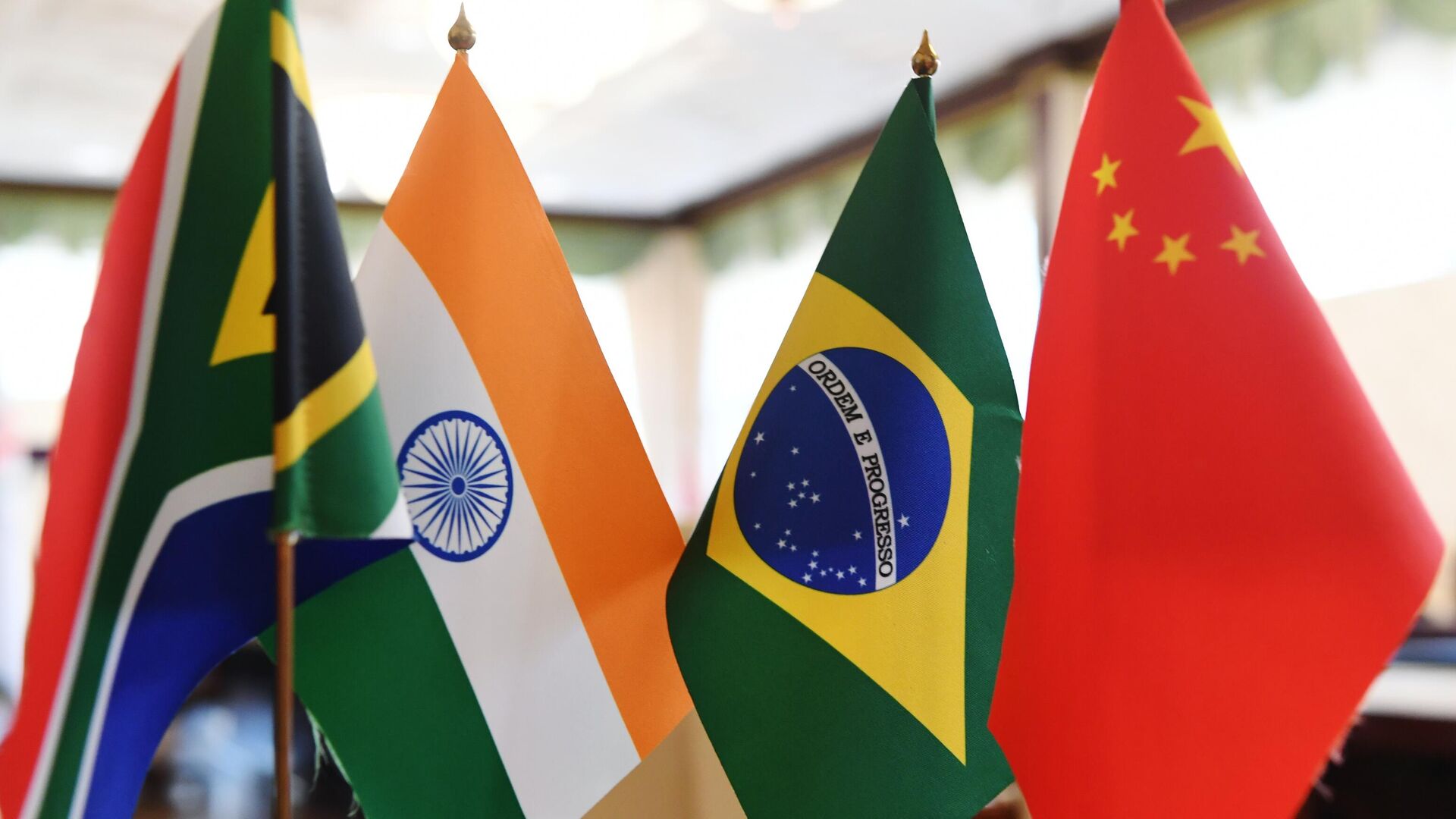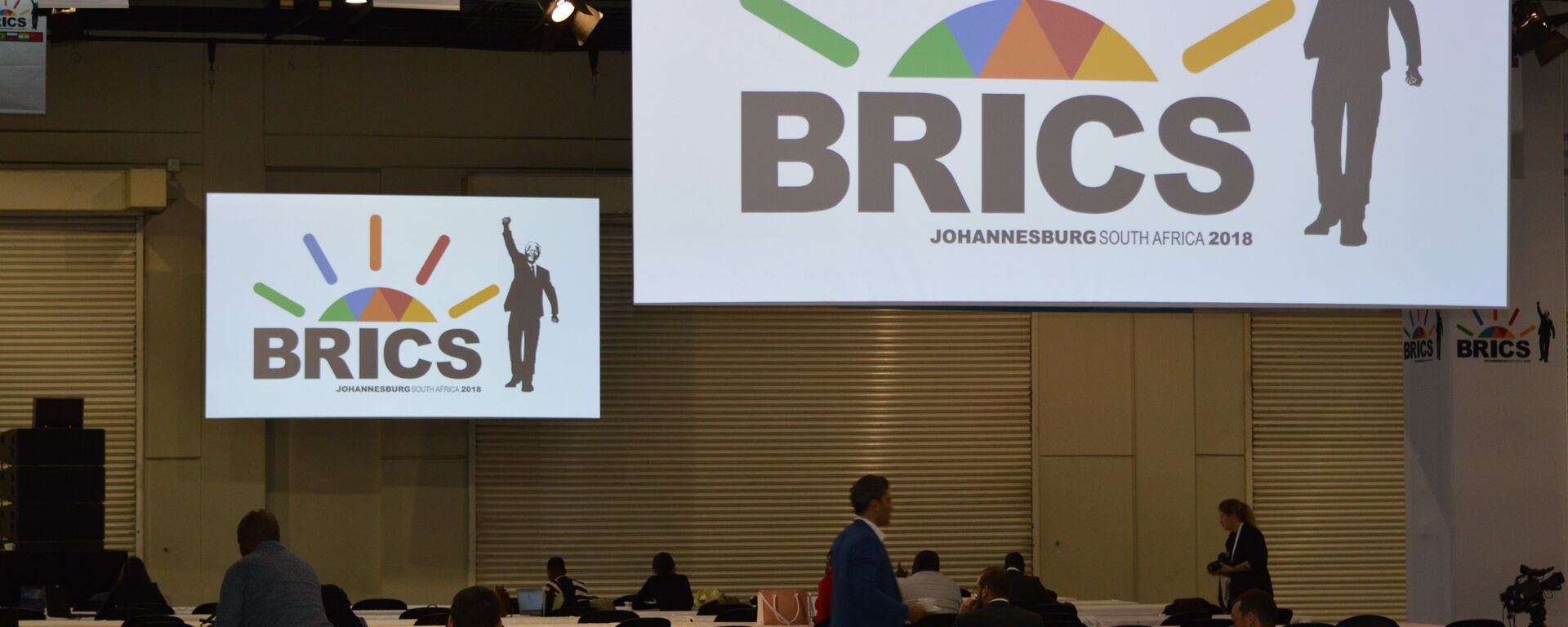https://en.sputniknews.africa/20230429/brics-de-dollarization-initiative-would-benefit-africas-economy-expert-says-1058923068.html
BRICS' De-Dollarization Initiative Would Benefit Africa's Economy, Expert Says
BRICS' De-Dollarization Initiative Would Benefit Africa's Economy, Expert Says
Sputnik Africa
The BRICS' crusade to create a new financial infrastructure would have a positive impact on development prospects of African nations, said Ashraf Patel in an interview with Sputnik.
2023-04-29T12:31+0200
2023-04-29T12:31+0200
2023-08-03T10:44+0200
opinion
southern africa
south africa
brics
brics expansion
brics summit
cooperation
finance
de-dollarization
ditching dollar
https://cdn1.img.sputniknews.africa/img/07e7/04/0b/1058514837_0:305:3098:2048_1920x0_80_0_0_a84a29b3f576d14e4ce98520c7ad8f8c.jpg
The crusade by the BRICS (Brazil, Russia, India, China and South Africa) group of nations to create a new financial infrastructure would have a positive impact on the development prospects of African nations, said Ashraf Patel, a senior research associate with the Institute for Global Dialogue and member of the South Africa BRICS Think-Tank Network, in an interview with Sputnik.Noting that the launch of the BRICS alternative reserve currency would be "a huge boost" for Africa, he emphasized that a proper payment mechanism is needed to make sure it is beneficial for all the parties concerned. In this regard, Patel stressed that BRICS should work closer with the African Union and other regional blocs, and also invite the organization to the forthcoming BRICS summit. Patel explained that this initiative is particularly important for African countries, given that many of them are facing the challenge of huge debt repayments, and "this is mainly with the creditors in the North," such as the IMF. He recalled that the world's major financial institutions haven't offered either a sustainable solution to the African nations' debt problems, or debt rescheduling. 'Tectonic Shift' Towards East and South in Global ArchitectureOver the past several months, the BRICS member states and other countries across the globe have made major strides in adopting alternative currencies, in particular China's yuan, for trade deals. Patel noted that many states, including Russia, China, India, Iran, Argentina, and Brazil have embarked on "a definite policy shift" in using other currencies instead of the US dollar. He explained that this trend is currently gaining momentum as it goes beyond trade relations, altering the "geographic economic reality" and global politics with the economic power shifting from the North to the East and South. Even though the dollar is still the world's dominant currency, he noted, there is a trend currently seen in EU policy that would be able to undermine the US' dominance in the international financial system. He explained that the EU is now trying "to take an independent line in world affairs, both politically, foreign policy-wise, and economically". The countries are willing to diversify their trade relations and follow a more independent foreign policy which could ultimately be a cause of concern for the US, the expert said. Patel also recalled that many nations have recently voiced their intention to join the BRICS bloc. He noted that these countries, such as Argentina, Saudi Arabia and Iran are "the powerhouses in the developing world" and particularly in their regions. Therefore, they would be "a huge boost for BRICS states" in terms of expanding trade relations within the bloc and creating a new financial infrastructure. In this regard, he reiterated, it is necessary to make sure that African nations are also part of these major developments.
https://en.sputniknews.africa/20230426/south-africa-lauds-brics-as-champion-in-addressing-unequal-global-political-architecture-1058856276.html
southern africa
south africa
Sputnik Africa
feedback@sputniknews.com
+74956456601
MIA „Rossiya Segodnya“
2023
News
en_EN
Sputnik Africa
feedback@sputniknews.com
+74956456601
MIA „Rossiya Segodnya“
Sputnik Africa
feedback@sputniknews.com
+74956456601
MIA „Rossiya Segodnya“
brics, de-dollarization, south africa, cooperation, alternative reserve currency, us dollar, yuan
brics, de-dollarization, south africa, cooperation, alternative reserve currency, us dollar, yuan
BRICS' De-Dollarization Initiative Would Benefit Africa's Economy, Expert Says
12:31 29.04.2023 (Updated: 10:44 03.08.2023) Last year, the BRICS bloc announced it is working on creating a new reserve currency, an alternative to the US dollar that would be backed by hard assets. The initiative is expected to be discussed at the forthcoming BRICS Summit in South Africa in August this year.
The crusade by the BRICS (Brazil, Russia, India, China and South Africa) group of nations to create a new
financial infrastructure would have a positive impact on the development prospects of African nations, said
Ashraf Patel, a senior research associate with the Institute for Global Dialogue and member of the South Africa BRICS Think-Tank Network, in an interview with Sputnik.
"The BRICS alternative reserve currency would have a positive effect for African nations. Most of them are commodity export countries - especially minerals and oil - and agriculture. So, the first step would be to start trading those commodities with an alternative currency," he said.
Noting that the launch of the BRICS alternative reserve currency would be "a huge boost" for Africa, he emphasized that a proper payment mechanism is needed to make sure it is beneficial for all the parties concerned. In this regard, Patel stressed that BRICS should
work closer with the African Union and other regional blocs, and also invite the organization to the forthcoming BRICS summit.
Patel explained that this initiative is particularly important for African countries, given that many of them are facing the challenge of huge debt repayments, and "this is mainly with the creditors in the North," such as the IMF. He recalled that the world's major financial institutions haven't offered either a sustainable solution to the African nations' debt problems, or debt rescheduling.
"So this suggests that the IMF and Northern or Western banks have not really come to a commitment on debt relief. And this makes the forthcoming BRICS summit more important for African nations," he stated.
'Tectonic Shift' Towards East and South in Global Architecture
Over the past several months, the BRICS member states and other countries across the globe have made major strides in adopting alternative currencies, in particular China's yuan, for trade deals. Patel noted that many states, including Russia, China, India, Iran, Argentina, and Brazil have embarked on "a definite policy shift" in using other currencies instead of the US dollar.
He explained that this trend is currently gaining momentum as it goes beyond trade relations, altering the "geographic economic reality" and global politics with the economic power shifting from the North to the East and South.
"Economics and political power are now both moving towards the East, and the South. So, it's part of a broader kind of tectonic shift towards East and towards South," Patel emphasized.
Even though the dollar is still the world's dominant currency, he noted, there is a trend currently seen in EU policy that would be able to undermine the US' dominance in the international financial system. He explained that the EU is now trying "to take an independent line in world affairs, both politically, foreign policy-wise, and economically". The countries are willing to diversify their trade relations and follow a more independent foreign policy which could ultimately be a cause of concern for the US, the expert said.
Patel also recalled that many nations have recently voiced their
intention to join the BRICS bloc. He noted that these countries, such as Argentina, Saudi Arabia and Iran are "the powerhouses in the developing world" and particularly in their regions. Therefore, they would be "a huge boost for BRICS states" in terms of expanding trade relations within the bloc and creating a new financial infrastructure. In this regard, he reiterated, it is necessary to make sure that African nations are also part of these major developments.
"And with China developing an alternative payment system, the financial architecture is now in place for that. And it would mean that BRICS would need concerted effort to bring South Africa as well as other nations in Africa, Nigeria and Kenya and Rwanda, into this mix," he said.


